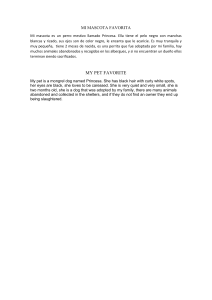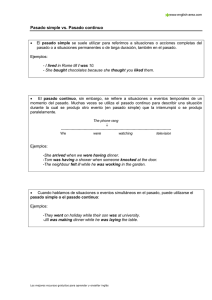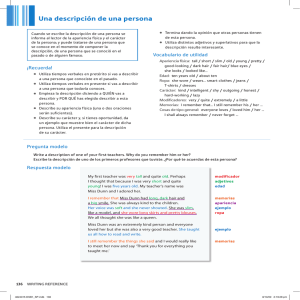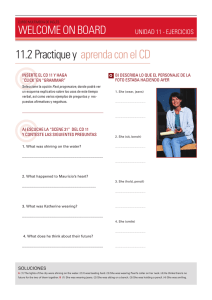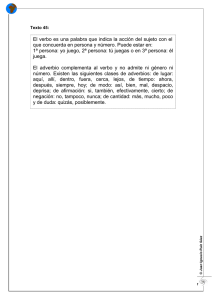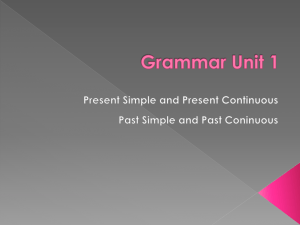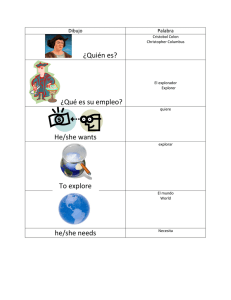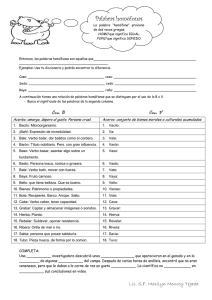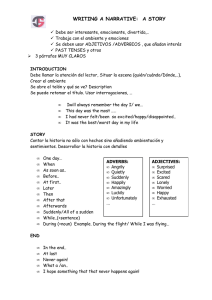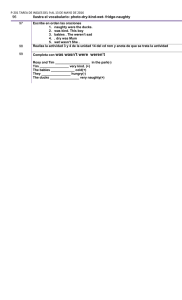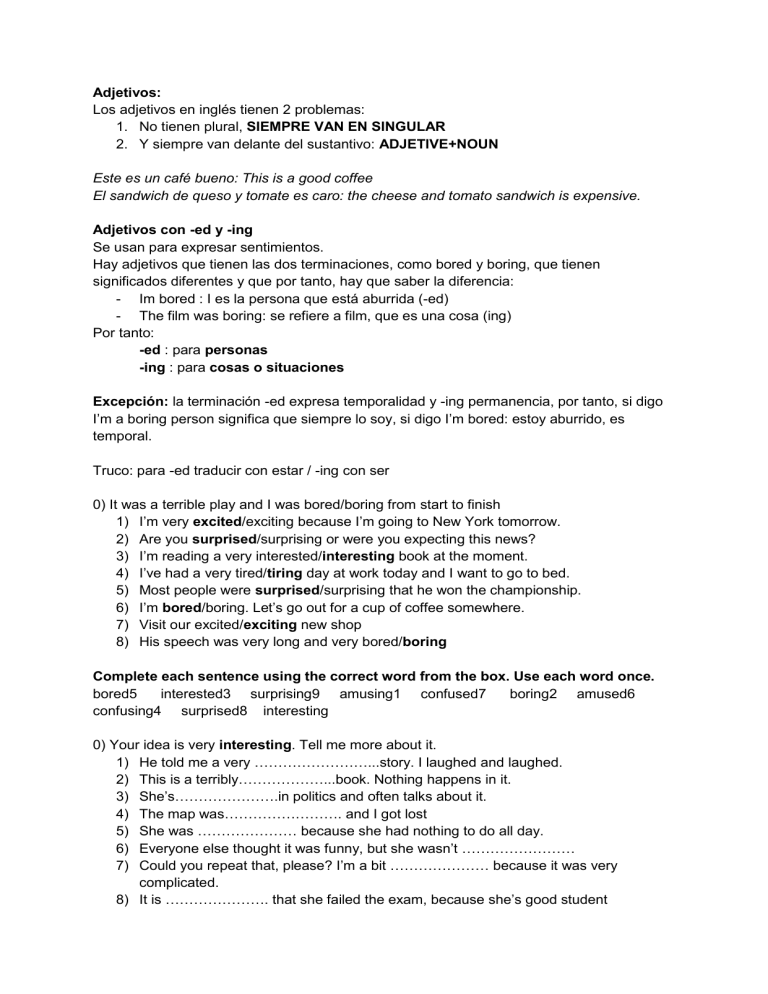
Adjetivos: Los adjetivos en inglés tienen 2 problemas: 1. No tienen plural, SIEMPRE VAN EN SINGULAR 2. Y siempre van delante del sustantivo: ADJETIVE+NOUN Este es un café bueno: This is a good coffee El sandwich de queso y tomate es caro: the cheese and tomato sandwich is expensive. Adjetivos con -ed y -ing Se usan para expresar sentimientos. Hay adjetivos que tienen las dos terminaciones, como bored y boring, que tienen significados diferentes y que por tanto, hay que saber la diferencia: - Im bored : I es la persona que está aburrida (-ed) - The film was boring: se refiere a film, que es una cosa (ing) Por tanto: -ed : para personas -ing : para cosas o situaciones Excepción: la terminación -ed expresa temporalidad y -ing permanencia, por tanto, si digo I’m a boring person significa que siempre lo soy, si digo I’m bored: estoy aburrido, es temporal. Truco: para -ed traducir con estar / -ing con ser 0) It was a terrible play and I was bored/boring from start to finish 1) I’m very excited/exciting because I’m going to New York tomorrow. 2) Are you surprised/surprising or were you expecting this news? 3) I’m reading a very interested/interesting book at the moment. 4) I’ve had a very tired/tiring day at work today and I want to go to bed. 5) Most people were surprised/surprising that he won the championship. 6) I’m bored/boring. Let’s go out for a cup of coffee somewhere. 7) Visit our excited/exciting new shop 8) His speech was very long and very bored/boring Complete each sentence using the correct word from the box. Use each word once. bored5 interested3 surprising9 amusing1 confused7 boring2 amused6 confusing4 surprised8 interesting 0) Your idea is very interesting. Tell me more about it. 1) He told me a very ……………………...story. I laughed and laughed. 2) This is a terribly………………...book. Nothing happens in it. 3) She’s………………….in politics and often talks about it. 4) The map was……………………. and I got lost 5) She was ………………… because she had nothing to do all day. 6) Everyone else thought it was funny, but she wasn’t …………………… 7) Could you repeat that, please? I’m a bit ………………… because it was very complicated. 8) It is …………………. that she failed the exam, because she’s good student 9) Everyone was ………………… by the sudden noise. Diferencia entre adjetivos y adverbios en inglés. Adjetivo: - Cualidad de algo - Siempre acompaña o dice algo del sustantivo o personas Adverbio: - Dice cómo el verbo hace algo - Acompaña al verbo He drives slow (adv o adj)? se pregunta ‘cómo?’ = adv He is a dangerous driver. He drives dangerously Todo adjetivo suele tener su adverbio: Slow slowly Dangerous dangerously Quick quickly Beautiful beautifully Bad badly Irregulares: Good well Hard hard Fast fast Exercise: 1. Could I have a quick word with you? 2. This is a slow train 3. He talked very interestingly about this work 4. You’ve cooked that meat wonderfully 5. I’ve got an easy job for you 6. She writes in perfect English 7. She sings very well 8. Could you speak more quietly, please? ADVERBIOS DE FRECUENCIA 1. Always 2. usually 3. often 4. sometimes 5. never 6. everyday 7. every + day (every thursday) 8. on + day + ‘s’ (on thursdays) 9. once a month 10. twice a month 11. three times a month 12. once a week 13. twice a week 14. three times a week Grupo 1: 1. always 2. usually 3. often 4. sometimes 5. never 3 4 y 5 Pueden ir a principio de oración Los adverbios de este grupo se colocan entre el sujeto y el verbo, siempre y cuando el verbo no sea to be. Si lo es, irá detrás del verbo. Ante una oración negativa, ponemos el adverbio entre la negativa y el verbo, es decir, delante del verbo principal. Ejemplos: I always go to school by bus I usually get up at 7 My grandma doesn’t go out. She’s always at home = el adverbio de frecuencia va detrás del verbo porque se trata del verbo to be Grupo 2: 1. every day 2. every+day 3. on+day+s 4. once a month 5. twice a month 6. three times a month 7. once a week 8. twice a week 9. three times a week Estos pueden ir tanto al principio como al final de la oración. How often? Aclaraciones: La palabra every es singular en inglés, por tanto, tanto day como cualquiera de los días que le pongamos, deben ir en singular. Los días de la semana los puedes usar en singular o plural. I have my English classes on Tuesdays and Thursdays. Hardly ever es otro adverbio de frecuencia que se pone entre el sujeto y el verbo y significa apenas/casi nunca: I hardly ever go to the cinema.
